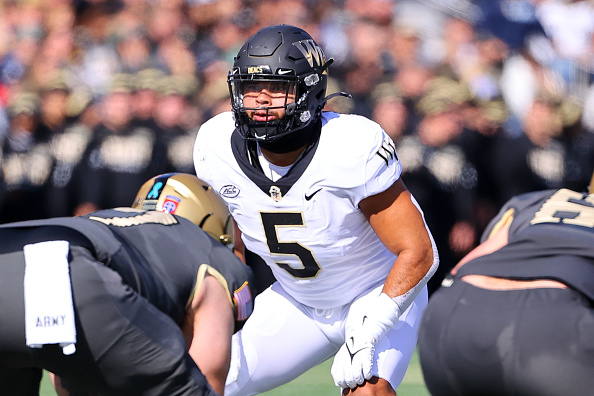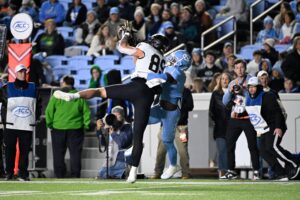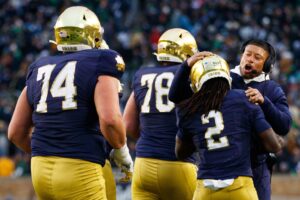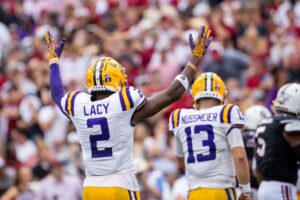With a defense that has a lot to prove in 2022, Wake Forest has been dealt a blow. Starting linebacker Ryan Smenda is being taken down by an NCAA error. He has to sit a game for a penalty that he did not commit.
After months of process and review, Wake Forest has been notified by the NCAA that their final appeal on Smenda’s behalf has been denied. That means Smenda, a fifth-year senior, will have to sit out the entirety of the season opener at home against VMI.
The Penalty
Smenda was called for a personal foul in the Gator Bowl over Rutgers at the end of the 2021 season. Late in the third quarter of the game, Rutgers quarterback Gavin Wimsatt took off running along the right side. After a six-yard gain, he went into his slide around the Rutgers 27-yard line.
Smenda was already in his forward diving motion for the tackle by the time Wimsatt went into his slide. There was no way for him to change direction. Because of the quarterback’s slide, Smenda actually wound up going over the top of Wimsatt. But he made incidental contact to the quarterback’s head with his forearm.
https://www.espn.com/video/clip?id=32969137
Head linesman Andy Warner threw a flag for the personal foul. There was not much Smenda could have done to change his direction on the play. It was a viable penalty nonetheless. But then the replay booth buzzed down to the officiating crew and tacked on a targeting penalty. Smenda was thrown out of the game. And because he was a repeat offender, the further penalty was not a suspension for the next half of the next game, but the entire game. That would be the 2022 season opener against VMI.
The Rule
The targeting penalty was later confirmed as an inappropriate call. The NCAA rule book defines targeting as when a player “takes aim at an opponent for purposes of attacking with forcible contact that goes beyond making a legal tackle or legal block or playing the ball.” Smenda’s only contact was incidental and only because the player slid to avoid the linebacker’s tackle.
The NCAA provides further examples of targeting:
- A player leaving his feet to attack an opponent by an upward and forward thrust of the body to make forcible contact in the head or neck area.
- A crouch followed by an upward and forward thrust to attack with forcible contact at the head or neck area, even though one or both feet are still on the ground.
- A player leading with helmet, shoulder, forearm, fist, hand, or elbow to attack with forcible contact at the head or neck area.
- A player lowering his head before attacking by initiating forcible contact with the crown of the helmet.
The only thing that comes close to this play is the third example. But Smenda’s contact with his arm was incidental and grazing. There was no “forcible contact” at the head or neck area.
A New Rule
The NCAA has adopted a change to the post-mortem for targeting calls. The conference can now review targeting calls after the game. If it is determined that the penalty was in error, then the resulting suspension can be reversed. The hang-up, as it pertains to the Smenda and Wake Forest, is that the new review process does not take effect until the 2022 season.
Wake head coach Dave Clawson said Saturday that he had gone over the tape of the penalty with ACC Supervisor of Officiating Dennis Hennigan. Clawson said, “Our supervisor of officials, Dennis Hennigan, looked at it and said there was no way that was targeting.”
The hang-up there is that this was a bowl game, officiated by a Big 12 crew. The call would not be subject to ACC review even if the new review rule were in place.
So, Wake Forest took the review to the national level. They submitted the appeal to Steve Shaw, the National Coordinator of Officials for the NCAA. Clawson had hoped that with the evidence and support of others that it was not targeting, Smenda could be grandfathered into the new rule and not have to serve the suspension.
Not Applying The New Rule
Wake got its answer at the end of Fall training camp. There would be no review in the national office, and Smenda would have to serve his one-game suspension. Clawson said the reason for the denial was not that the call was correct. “The explanation that I was given is that they would have to go back and look at every call in the second half of last games last year in all levels of college football,” Clawson said Saturday.
Last Word has spent hours over the last week reviewing penalties statistics from the 2021-22 bowl games. We found no other case where there is a call that is resulting in a player having to miss the entire 2022 season opener. Admittedly, we did the search only at the FBS level. We also find no record of any other appeals for a season-opening suspension. Smenda’s case is the only one we can find. So Shaw’s office would only have to agree to review the one. But they will not be doing that.
We reached out to Stanford head coach David Shaw, (no relation to Steve Shaw). The Cardinal coach is also the chair of the NCAA rules committee. We wanted to get a sense of whether, in his NCAA capacity, he felt the rule was being correctly applied to the one case. Through a school spokesperson, Shaw declined to comment on this specific issue.
Different Conferences Equal Different Officiating
The fact that Wake Forest can and should beat VMI without its second-leading tackler from last year is not really the point. The NCAA opted not to right an obvious wrong for fear of opening the can of worms that it might have to review and discern many wrongs from the end of the season.
Clawson has become an increasingly vocal advocate for college football pulling away from the NCAA, and governing itself with a commissioner. It would, at the very least address one of the biggest flaws in college football officiating. Each crew works for a conference, instead of the NCAA. They are each trained by conference officiating supervisors, and thus subjected to varying interpretations of the rules and their applications. Implementation of the rules is not uniform from conference to conference. This puts the balance of games into sometimes inequitable circumstances.
One body with one set of training across the college football landscape could have solved that problem. It does not appear the NCAA will be that body.






